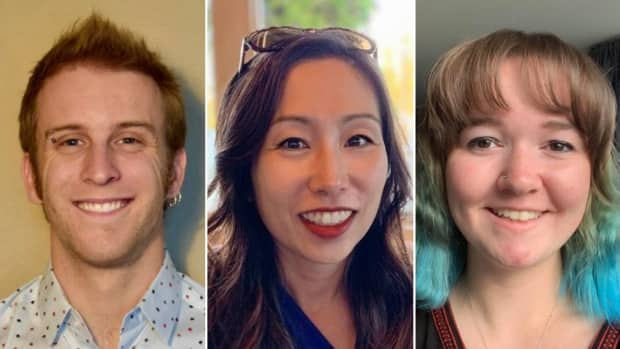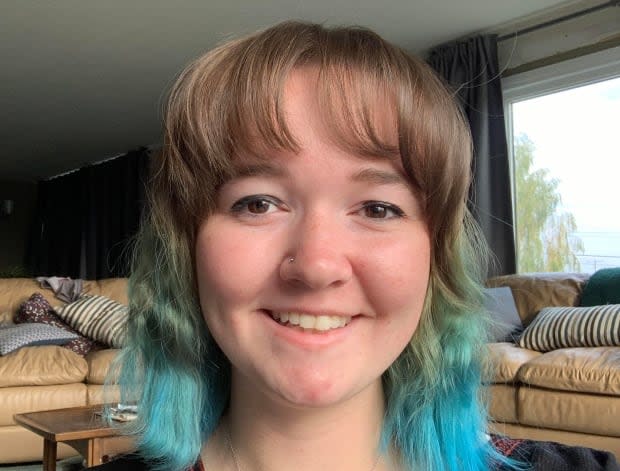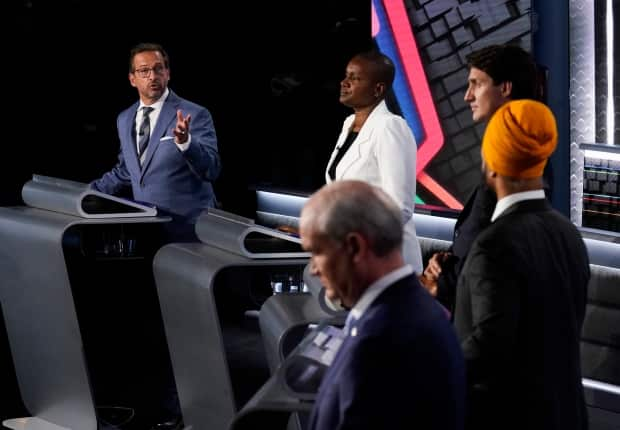'My grandkids will have to be geniuses': Spending levels boost anxiety for these Alberta voters

It was free money, but it left Ollie Schwartz frustrated.
"My grandkids will have to be geniuses to get out of this hole," said the retired senior, standing on her front steps in east Calgary.
The one-time $500 payment Schwartz got was mailed to anyone eligible for Old Age Security this summer.
But for Schwartz, the cheque in her mailbox was one more example of government spending driving a deficit that should be the biggest issue candidates debate this federal election.
And in that, she's not alone.
Over a decade of research and polling suggests people in Alberta are highly concerned about government debt and fiscal prudence — more so than in nearly anywhere else in the country.
It's been obvious this campaign in the polling: one in three Albertans picked the deficit/government spending as one of their top three issues this campaign in the Angus Reid weekly polling.
It also mirrors what CBC Calgary heard in its voters' focus group, where many of the 20 participants from across southern Alberta identified that as one among their key issues.
And as the CBC continues its series talking with residents in the east Calgary riding of Calgary Forest Lawn, many of them said the same thing.
They're worried it shows a lack of planning, concerned money is not being spent wisely, and anxious for a future where that debt gets out of hand.

Worried without a plan
"Spending money is the problem," said Belle Winsor, a young adult we caught up with while she was helping out with kids' soccer in Marlborough.
She's a recent high school graduate trying to avoid debt herself by taking a year off to work before heading to college.
She traces her frustration to a past social studies class, where she got the chance to hear directly from Prime Minister Justin Trudeau in Calgary.
The Liberal leader outlined his plans for post-secondary — increasing student grants and eliminating interest on loans.
She felt anxious.
"It was (going to cost) a lot of money and it started clicking in my mind," she said.
"As a taxpayer — or soon to be, anyway — what does that look like for me? I know the government gets a lot of its money from taxpayers, so if we're going to do all this spending and spending, obviously, it means my taxes go up."
"I don't want my country to be in a whole bunch of debt that we're still trying to pay off years later," she continued. "It's really important because it's not just for me, it's for future generations down the road."
Janet Brown has spent the past 30 years talking with Albertans from across the political spectrum as a local pollster and political commentator. She says this concern with debt and sustainability goes right down to core values.
Not everyone is focused on the deficit, of course. But ever since the days of former premier Ralph Klein, there's been a core group of people who want to balance the budget, she says. Klein spoke on TV comparing Alberta's deficit to credit card debt and really connected with Albertans at a deep level.
Now it's just part of the way many Albertans view life, Brown says.
"There's something about our fiscal conservative nature where we never stop thinking about debt and deficit. Federally, you hear people say things like 'debt is OK if it's only a certain percentage of the GDP.' These are arguments that have never worked so well in Alberta."
Despite those values, it doesn't seem like any of the main parties are treating the deficit as a top priority, Brown says.
"Even the Conservatives' plan doesn't seem realistic."

The party plans
The Conservatives released a budget estimate for their plans last week that would see $52.5 billion in new spending over five years. They're not planning to return to a balanced budget for 10 years, and Conservative Leader Erin O'Toole says that would be accomplished through growth in the economy rather than cuts.
The Liberal Party is promising $78 billion in new spending without any firm commitment to a balanced budget.
The NDP promise the most spending — $214 billion in new spending over five years — but their plan promises the smallest deficits most years because it proposes to off-set the costs with increased taxes on wealthy individuals and corporations.
"I find it kind of hard to figure out if it's balancing," said Winsor. "Is their spending going to be equal in a way, or is it going to be all spending?"
She says she's still deciding whom to vote for.
In Alberta, one in three people say the deficit/government spending is among their top three priorities this election, said Angus Reid research director Dave Korzinski, adding together four surveys.
Combined, the online poll included 600 Alberta-based respondents over the past month.
The deficit is a top issue
The deficit was second only to the economy as an issue in Alberta, and substantially more important as an issue in Alberta than in the rest of the country, he said.
Nationally, one in five people picked spending and the deficit in their top three. Climate change, improving health care access and taxes ranked higher.
Brown is waiting for more polling to see how the parties' large budget promises will affect the vote in Alberta. Voters looking for a balanced budget might be discouraged by the main party platforms, but it's too early to guess whether or not they will stay home.

Becky Wong isn't staying home but is unsure who to vote for.
She's a Calgary resident and part of the voters' focus group for CBC. For her, spending wisely is even more important than balancing the budget, at least for this specific election, because of the on-going pandemic.
She was leaning Conservative, but a policy like the December GST holiday doesn't give her confidence.
"I'm trying to understand whether they are working to address the core of the problem," she said. "So for example, the GST holiday. That's a one and done thing. Is that really going to benefit the economy? … It's going to benefit those big-box stores."
'What are we paying for?'
On the other hand, Alex Sutherland just cast his vote in the advance polls. He went Conservative.
"I had a really hard time voting this year because I didn't love any of the parties. This election it was the least worst candidate, not the best candidate," he said.
Sutherland is a Mayland Heights resident, a human resources consultant and another Albertan who really wanted to see a clear plan for a balanced budget. He also happens to be on the CBC voters' focus group.
For him, having a pathway to balance shows him the party is thinking about big picture questions: rebuilding the economy and protecting it against an uncertain future.
"I just want to hear that there's a plan and that we're not just careening off an edge, and it's going to be OK," he said.
"It all rolls together. The debt is worrisome because the economy isn't there to pay for the debt and the economy isn't there because there's no plan. And if there's no plan, then what are we paying for?"
CBC Calgary is on the ground in the riding of Calgary Forest Lawn, which spans more than a dozen neighbourhoods east of Deerfoot Trail, because that riding had the lowest voter turnout in Alberta during the last election. We're there right through the campaign seeking out perspectives we might not hear otherwise.
But we also want to hear from everyone. Take a minute to fill out this form and let us know what you want the candidates to be talking about as they try to win your vote. We'll read every answer and use them to help guide our broader election coverage.

